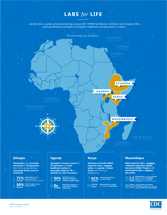Care and Treatment Resources
On this Page
- Technical Brief: Drug Interactions between Hormonal Contraceptive Methods & Anti-Retroviral Medications Used to Treat HIV (2014)
- Technical Brief: Hormonal Contraception and HIV (2013)
- Tools for Implementing Tuberculosis Infection-Control Activities in HIV Clinics and Outpatient Settings
- Early Infant Diagnosis: Implementation Guides
- Pediatric Antiretroviral Dosing Guide Chart
In addition to direct technical assistance to Ministries of Health and partner organizations in resource-constrained countries, CDC provides critical leadership in the development of a wide range of resources for the management, delivery, and monitoring of HIV/AIDS programs.
Technical Brief: Drug Interactions between Hormonal Contraceptive Methods and Anti-Retroviral Medications Used to Treat HIV (2014)
The purpose of this brief is to summarize what is known about potential drug interactions between certain hormonal contraceptive methods and certain antiretrovirals (ARVs) used to treat HIV. The brief also discusses recommendations and programmatic implications. It was produced in collaboration with the U.S. President’s Emergency Plan for AIDS Relief (PEPFAR) and the Office of Population and Reproductive Health at the U.S. Agency for International Development (USAID), with technical input from FHI 360.
Technical Brief: Hormonal Contraception and HIV (2013)
The purpose of this brief is to summarize current epidemiological evidence regarding use of hormonal contraception (HC) and
- Whether HIV-negative women will acquire HIV
- Whether women living with HIV will transmit HIV to their male sex partner(s)
- Whether women living with HIV will experience faster HIV disease progression
- Whether women living with HIV using antiretroviral therapy (ART) will experience drug-drug interactions
Arabic PDF | English PDF | French PDF | Portuguese PDF | Spanish PDF
Tools for Implementing Tuberculosis Infection-Control Activities in HIV Clinics and Outpatient Settings
Transmission of tuberculosis (TB) is a major concern in the health care and community facilities where people living with HIV/AIDS receive services in resource-limited countries. CDC has developed tools and job aids for outpatient clinics to help improve TB infection control.
Early Infant Diagnosis: Implementation Guides
Early diagnosis of HIV in infants provides a critical opportunity to strengthen follow-up of HIV-exposed children, assure early access to ARV treatment for infected children, provide reassuring information to families of uninfected children, aid evaluation of PMTCT programs, and increase capacity to use laboratory technology.
Pediatric Antiretroviral Dosing Guide Chart
The "Pediatric Antiretroviral Dosing in Resource-limited Settings" is an easy-to-use chart on antiretroviral drug doses for infants and children as recommended by the World Health Organization. CDC, the International Center for AIDS Care and Treatment Programs (ICAP) of Columbia University Mailman School of Public Health, and the Baylor International Pediatric AIDS Initiative (BIPAI) of the Baylor College of Medicine collaborated to develop this chart.
WHO and HHS/CDC Prevention of Mother-to-Child Transmission of HIV (PMTCT) Generic Training Package
The World Health Organization (WHO) and CDC have collaborated to develop the Prevention of Mother-to-Child Transmission of HIV (PMTCT) Generic Training Package. Recognizing that building human capacity requires collaboration at multiple levels and across organizations, the curriculum is designed to support the scale up of PMTCT services and assist in unifying and strengthening existing PMTCT training efforts.
Testing and Counseling for PMTCT Support Tools
These tools were developed by the CDC, in collaboration with the Department of HIV/AIDS at the World Health Organization, United Nations Children's Fund and United States Agency for International Development and their implementing partners.
Labs for Life Infographic:

Get email updates
To receive email updates about this page, enter your email address:
Contact Us:
- Centers for Disease Control and Prevention
1600 Clifton Rd
Atlanta, GA 30333 - 800-CDC-INFO
(800-232-4636)
TTY: (888) 232-6348
24 Hours/Every Day - Contact CDC-INFO
 ShareCompartir
ShareCompartir


